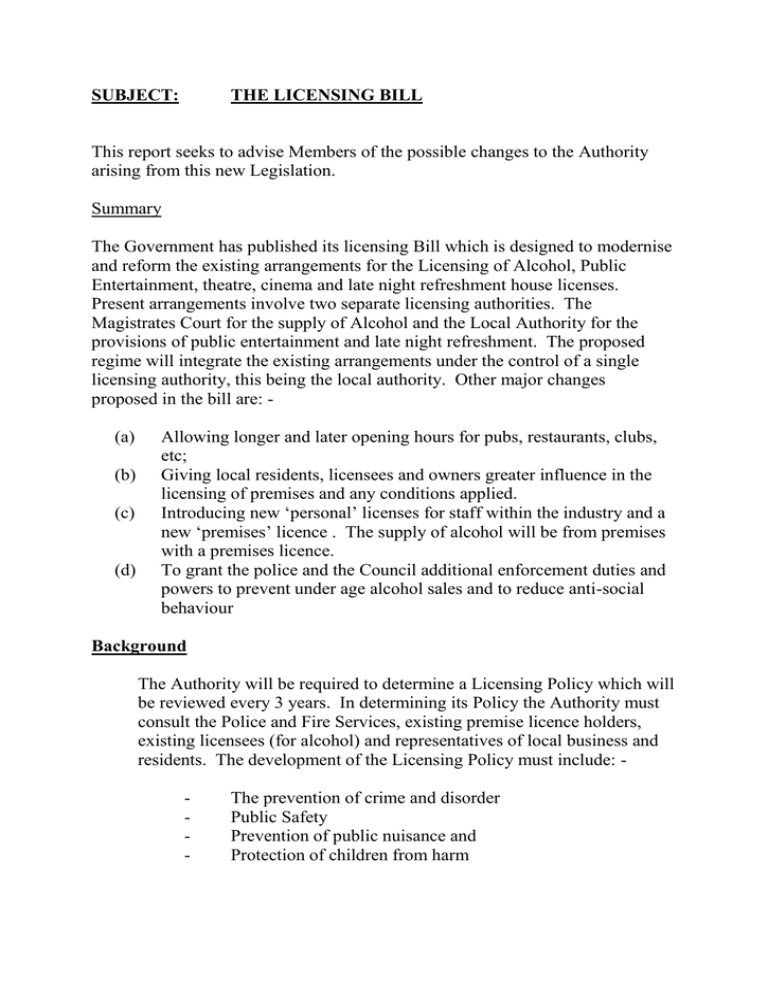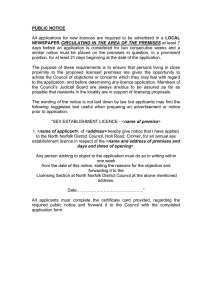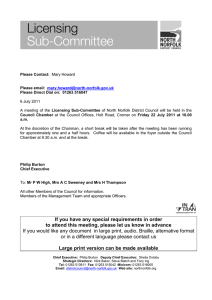SUBJECT: THE LICENSING BILL
advertisement

SUBJECT: THE LICENSING BILL This report seeks to advise Members of the possible changes to the Authority arising from this new Legislation. Summary The Government has published its licensing Bill which is designed to modernise and reform the existing arrangements for the Licensing of Alcohol, Public Entertainment, theatre, cinema and late night refreshment house licenses. Present arrangements involve two separate licensing authorities. The Magistrates Court for the supply of Alcohol and the Local Authority for the provisions of public entertainment and late night refreshment. The proposed regime will integrate the existing arrangements under the control of a single licensing authority, this being the local authority. Other major changes proposed in the bill are: (a) (b) (c) (d) Allowing longer and later opening hours for pubs, restaurants, clubs, etc; Giving local residents, licensees and owners greater influence in the licensing of premises and any conditions applied. Introducing new ‘personal’ licenses for staff within the industry and a new ‘premises’ licence . The supply of alcohol will be from premises with a premises licence. To grant the police and the Council additional enforcement duties and powers to prevent under age alcohol sales and to reduce anti-social behaviour Background The Authority will be required to determine a Licensing Policy which will be reviewed every 3 years. In determining its Policy the Authority must consult the Police and Fire Services, existing premise licence holders, existing licensees (for alcohol) and representatives of local business and residents. The development of the Licensing Policy must include: - The prevention of crime and disorder Public Safety Prevention of public nuisance and Protection of children from harm The Bill brings potential for licensed premises to operate 24 hours, 7 days per week. This could significantly expand the night time economy bringing additional demands and costs in dealing with crime, disorder, waste, noise and enforcement. In addition, a considerable number of premises including certain types of Late Night Internet Houses have not previously required licensing by the Council, will now need to be licensed. The Bill states that there must be a Licensing Committee, and only it can deal with Licensing Act applications. It is likely that there will be a substantial amount of applications to be dealt with by the Licensing Committee, particularly during the initial period of the new legislation. Prescribed time periods are set to deal with certain applications, for temporary events being as short as 10 days. The Government has indicated its preference for a standard licensing fee. Initial estimates are that on first application a premises licence will cost between £100 and £500 depending on size and activities carried on. In the second and subsequent years this will drop to a maintenance (rather than a licence renewal) fee of 50%. The licence once granted lasts for the life of the business. A person licence is estimated at £30 and will last for 10 years without an annual maintenance fee. The Government has stated that they will not be funding local authorities to enable them to deal with the new work as they expect it to be self funding from the fees received by Local Authorities. The current view of Local Authorities nationally is that the likely level of fees will be far too low. IMPLICATIONS Additional duties for the provision, regulation and enforcement of alcohol licensing. This will have significant financial, staffing and administration impacts, the implications of which have yet to be quantified. The development of the Licensing Policy must involve in-depth consultation. Training will need to be carried out for Members and Staff. The Government has set out a timetable for implementation of the new regime. The timetable assumes the Bill becomes law in July 2003, applications by existing License Brokers will have to be dealt with by the Council with effect from January, 2004 and full responsibility for liquor licensing will be transferred to the Council from the Magistrates Court in July 2004. Recommendations That Members note the content of this report.

